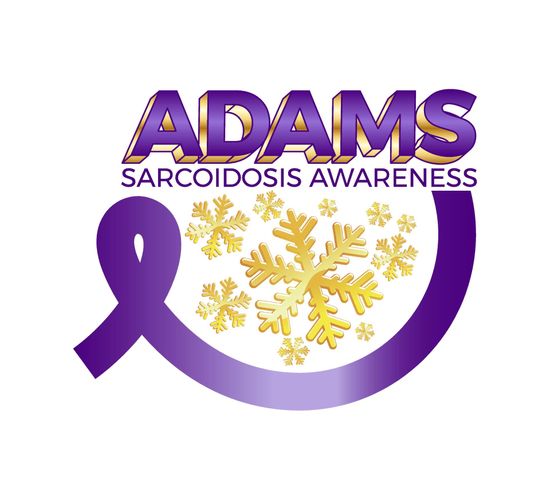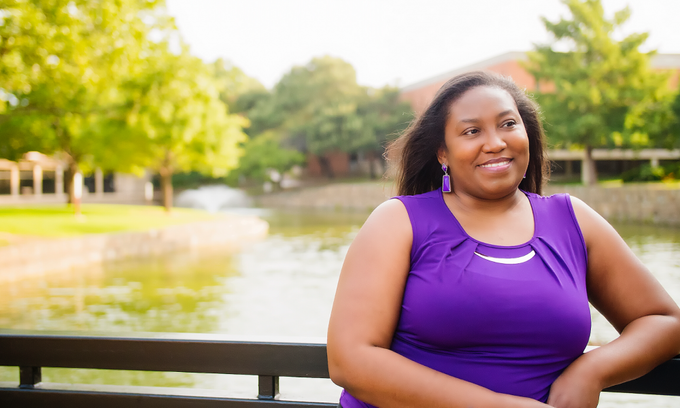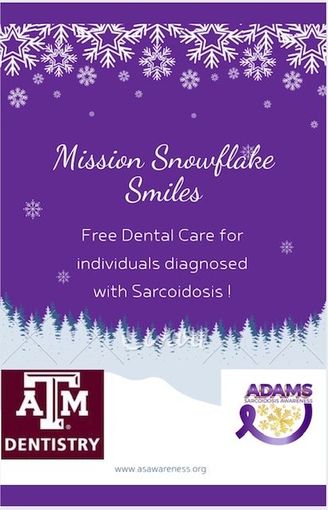Adams Sarcoidosis Awareness
Improving lives, one snowflake at a time.
Click Here to Donate Walk/Run Registration
Our Story
About Us

Meet Ericka
Our Founder

Once thought rare, sarcoidosis is now known to be common, and affects people worldwide. It’s estimated that the prevalence of sarcoidosis in the U.S. ranges between 150,000 and 200,000, with an estimated 1.2 million individuals with sarcoidosis worldwide.
Snowflakes represent the unique challenge of living with sarcoidosis—no two people are alike! Some may require little treatment, and others may require intensive treatments over many years.

What We're Fighting
Sarcoidosis FAQs
- What is Sarcoidosis?
Sarcoidosis (pronounced SAR-COY-DOE-SIS) is a non-contagious, inflammatory immune system disease characterized by the formation of granulomas, tiny clumps of inflammatory cells that can cause any organ in the body to not work properly, and in some cases, causes the organ to shut down. Affected organs in the body can include the heart, skin, liver, kidneys, brain, sinuses, eyes, muscles, bones, and others. Sarcoidosis most commonly targets the lungs and the lymph nodes.
- What are the symptoms?
Signs and symptoms of sarcoidosis vary depending on which organs are affected. Sarcoidosis sometimes develops gradually and produces symptoms that last for years. Other times, symptoms appear suddenly and then disappear just as quickly. Many people with sarcoidosis have no symptoms, so the disease may be discovered only when a chest X-ray is done for another reason.
General symptoms:
Sarcoidosis can begin with these signs and symptoms:
- Fatigue
- Swollen lymph nodes
- Weight loss
- Pain and swelling in joints, such as the ankles
Lung symptoms:
Sarcoidosis most often affects the lungs and may cause lung problems, such as:
- Persistent dry cough
- Shortness of breath
- Wheezing
- Chest pain
Skin symptoms:
Sarcoidosis may cause skin problems, which may include:
- A rash of red or reddish-purple bumps, usually located on the shins or ankles, which may be warm and tender to the touch
- Disfiguring sores (lesions) on the nose, cheeks and ears
- Areas of skin that are darker or lighter in color
- Growths under the skin (nodules), particularly around scars or tattoos
Eye symptoms:
Sarcoidosis can affect the eyes without causing any symptoms, so it's important to have your eyes checked regularly. When eye signs and symptoms do occur, they may include:
- Blurred vision
- Eye pain
- Burning, itching or dry eyes
- Severe redness
- Sensitivity to light
Heart symptoms:
Signs and symptoms related to cardiac sarcoidosis may include:
- Chest pain
- Shortness of breath (dyspnea)
- Fainting (syncope)
- Fatigue
- Irregular heartbeats (arrhythmias)
- Rapid or fluttering heart beat (palpitations)
- Swelling caused by excess fluid (edema)
Sarcoidosis can also affect calcium metabolism, the nervous system, the liver and spleen, muscles, bones and joints, the kidneys, lymph nodes, or any other organ.
When to see a doctor:
See your doctor if you have signs and symptoms of sarcoidosis as listed above.
Sarcoidosis information sourced from The Mayo Clinic.
Disclaimer: Please note that the information provided on this website is not intended to diagnose, treat, cure or prevent any disease. The material on this website is provided for informational purposes only and is not intended to be taken as medical advice.
- What are possible causes of Sarcoidosis?
Doctors don't know the exact cause of sarcoidosis. Some people appear to have a genetic predisposition to develop the disease, which may be triggered by bacteria, viruses, dust or chemicals.
This triggers an overreaction of your immune system, and immune cells begin to collect in a pattern of inflammation called granulomas. As granulomas build up in an organ, the function of that organ can be affected.
Sarcoidosis information sourced from The Mayo Clinic.
Disclaimer: Please note that the information provided on this website is not intended to diagnose, treat, cure or prevent any disease. The material on this website is provided for informational purposes only and is not intended to be taken as medical advice.
- What are the risk factors for developing the disease?
While anyone can develop sarcoidosis, factors that may increase your risk include:
- Age and sex. Sarcoidosis can occur at any age, but often occurs between the ages of 20 and 60 years. Women are slightly more likely to develop the disease.
- Race. People of African descent and those of Northern European descent have a higher incidence of sarcoidosis. African-Americans are more likely to have involvement of other organs along with the lungs.
- Family history. If someone in your family has had sarcoidosis, you're more likely to develop the disease.
Sarcoidosis information sourced from The Mayo Clinic.
Disclaimer: Please note that the information provided on this website is not intended to diagnose, treat, cure or prevent any disease. The material on this website is provided for informational purposes only and is not intended to be taken as medical advice.
- What are the potential complications of Sarcoidosis?
Sometimes sarcoidosis causes long-term problems.
Lungs.
Untreated pulmonary sarcoidosis can lead to permanent scarring in your lungs (pulmonary fibrosis), making it difficult to breathe and sometimes causing pulmonary hypertension.
Eyes.
Inflammation can affect almost any part of your eye and may cause damage to the retina, which can eventually cause blindness. Rarely, sarcoidosis also can cause cataracts and glaucoma.
Kidneys.
Sarcoidosis can affect how your body handles calcium, which can lead to kidney stones and reduce kidney function. Rarely, this can lead to kidney failure.
Heart.
Cardiac sarcoidosis results in granulomas in your heart that can disrupt heart rhythm, blood flow and normal heart function. In rare instances, this may lead to death.
Nervous system.
A small number of people with sarcoidosis develop problems related to the central nervous system when granulomas form in the brain and spinal cord. Inflammation in the facial nerves, for example, can cause facial paralysis.
Sarcoidosis information sourced from The Mayo Clinic.
Disclaimer: Please note that the information provided on this website is not intended to diagnose, treat, cure or prevent any disease. The material on this website is provided for informational purposes only and is not intended to be taken as medical advice.
- What is Advanced Sarcoidosis?
Patients suffering from advanced sarcoidosis include those with chronic disease (active disease for more than 2-5 years) who:
- have worsening disease symptoms despite treatment (usually more than 10 mg corticosteroids and other therapeutic options); or
- still required treatment in the past year whether they experienced symptoms or not.
Approximately 5-10% of all patients diagnosed will suffer from advanced sarcoidosis. While several treatments have been proposed for these individuals, including recommendations based on the involved organs, the evidence available to guide doctors in their treatment decisions are limited. As a result, physicians try to balance the need for various therapies at varying doses with side effects and danger of disease progression. Beyond symptoms directly related to inflammation, advanced patients also often contend with fatigue, pain, cognitive failure, small fiber neuropathy, exercise limitation, depression and other comorbidities (e.g. diabetes, high blood pressure, etc.), which often result as side effects from current commonly used treatments.

Help Us Help Others
Donate to Adams Sarcoidosis Awareness
We rely on donations and funds raised through events to do the work we do. You can help us change the lives of sarcoidosis sufferers and their loved ones by donating today!
What sets Adams Sarcoidosis Awareness apart from other organizations is that our donations and fundraising funds go directly to benefiting the people we serve and producing educational material—not to the Board. No one from our Board of Directors gets paid, and all of our staff are VOLUNTEERS!!
Every cent of your donation goes to helping our team spread awareness to the community, set up support group meetings, coordinate with local pharmacies to deliver vital medicines to sarcoidosis sufferers, and more.
Donate $25+ and receive one of these shirts of your choosing!

For Volunteer Inquiries:
If you would like to volunteer with Adams Sarcoidosis Awareness, please click the button below and follow the instructions to send us your information.
For Financial Assistance Requests:
If you are suffering from sarcoidosis and need financial or medication copay assistance, please click the button below and follow the instructions to send us your information.
Mission Snowflake Smiles:
If you have been diagnosed with sarcoidosis, please click the button below and follow the instructions to send us your information to receive free dental care.
Click here to find us on the GuideStar directory of nonprofits.

We're Here for You
Support Group Meetings
We provide a Support Group Meeting on the 2nd Saturday of each month at Methodist Hospital in Richardson, Texas, 10am-11am.
Please join us if you or a loved one are looking for a safe, supportive community to discuss your battle with Sarcoidosis.

Partners in the Fight
Our Ambassador
We are proud to have Justin Hardee, NFL athlete playing for the New York Jets, as an Adams Sarcoidosis Awareness Ambassador.
Justin knows the struggles that Sarcoidosis patients and their families face while battling the disease, since Justin's mother, Estella, battled Sarcoidosis for 15 years. Estella passed away December 12, 2013 at the young age of 55.
Justin's greatest motivation has and will always be his mom, both on and off the football field. Looking for a way to memorialize her, and to provide assistance to patients and families in similar situations, Justin teamed up with Adams Sarcoidosis Awareness to establish The Estella Perryman Fund in her honor.
The fund, in partnership with Adams Sarcoidosis Awareness, has increased awareness and provided opportunities for Snowflakes in need of assistance. We are so grateful to have Justin join us in the fight against Sarcoidosis.
Our Sponsors
If you are interested in becoming an Adams Sarcoidosis Awareness sponsor, please contact us today.
A Day for Change
National Sarcoidosis Day
National Sarcoidosis Day is celebrated annually on April 13th across the U.S. The goal of National Sarcoidosis Day is to spread awareness of the debilitating disease, educating those who are unaware of sarcoidosis, and raising funds for research and patient support. Check our Facebook page often to see what Adams Sarcoidosis Awareness and other organizations are doing to celebrate National Sarcoidosis Day!
Look for the Helpers...
More Sarcoidosis Resources
- Online Resources
Foundation for Sarcoidosis Research
Bernie Mac Foundation
World Association of Sarcoidosis and other Granulomatous Disorders
- Hospitals and Research Facilities - USA
Baylor College of Medicine
Houston, Texas
713-798-2400
Baylor University Medical Center at Dallas
Dallas, Texas
214-820-6856
Boston Medical Center
Boston, Massachusetts
617-414-3479
Brigham and Women’s Hospital
Boston, Massachusetts
617-732-9894
Center for Asthma and Immune Lung Disease
Hawthorne, New Jersey
973-790-4111
Cleveland Clinic Florida
Weston, Florida
954-659-5450
Duke University
Raleigh, North Carolina
919-862-5520
East Carolina University
Greenville, North Carolina
252-744-1600
Emory University
Atlanta, Georgia
404-778-3261
Henry Ford Hospital
Detroit, Michigan
313-916-2421
Icahn School of Medicine at Mount Sinai
New York, New York
212-241-5656
iNova Fairfax Hospital
Falls Church, Virginia
703-776-3281
Jacobs School of Medicine and Biomedical Sciences at the University at Buffalo
Buffalo, New York
716-961-9900
Johns Hopkins University
Baltimore, Maryland
410-550-5864
Louisiana State University Health Science Center
Shreveport, Louisiana
318-675-5955
Loyola University Medical Center
Chicago, Illinois
888-584-7888
Mayo Clinic
Rochester, Minnesota
507-266-0415
MedStar Washington Hospital
Washington, DC
202-877-4698
North Point Pulmonary Associates
Cumming, Georgia
770-343-8760
NYU Langone Health
New York, New York
212-263-7951
Ohio State University
Columbus, Ohio
614-293-4925
Rochester Regional Health
Rochester, New York
585-442-5320
Rutgers, New Jersey Medical School/University Hospital
Newark, New Jersey
973-972-6111
Scripps Clinic
La Jolla, California
858-824-5073
Spectrum Health
Grand Rapids, Michigan
616-267-8244
Stanford Multidisciplinary Sarcoidosis Program
Stanford, California
650-724-4942
SUNY Upstate Medical University
Syracuse, New York
315-464-3835
Temple Lung Center
Philadelphia, Pennsylvania
215-707-8129
Thomas Jefferson University Hospital
Philadelphia, Pennsylvania
215-955-5161
University of Alabama
Birmingham, Alabama
205-996-5864
University of Arizona at Banner University Medicine Lung Institute
Phoenix, Arizona
602-521-3400
University of Arizona ILD Program
Tucson, Arizona
520-694-8888
University of California Los Angeles
Los Angeles, California
310-825-8061
University of Chicago
Chicago, Illinois
773-702-9660
University of Florida
Gainesville, Florida
352-265-0139
University of Kansas Hospital
Kansas City, Kansas
913-588-7204
University of Miami
Miami, Florida
305-243-2568
University of Michigan
Ann Arbor, Michigan
888-287-1084
University of North Carolina
Chapel Hill, North Carolina
919-843-9938
University of Oklahoma
Oklahoma City, Oklahoma
405-271-7001
University of Rochester Medical Center
Rochester, New York
585-273-3760
University of South Florida
Tampa, Florida
813-844-8371
University of Tennessee Health Science Center
Memphis, Tennessee
901-758-7888
University of Texas Southwestern MC, and Parkland Health & Hospital System
Dallas, Texas
214-648-3426
University of Texas Health Science Center Houston
Houston, Texas
713-704-4300
University of Utah
Salt Lake City, Utah
801-581-5943
University of Virginia
Charlottesville, Virginia
434-924-5219
Vanderbilt University
Nashville, Tennessee
615-936-0060
- Hospitals and Research Facilities - International
Australia
Dr. Roger Allen Pty Ltd. – Brisbane, Australia
Belgium
University Hospital Leuven – Brabant, Belgium
Canada
Mount Sinai Hospital – Toronto, Canada
China
Shanghai Pulmonary Hospital – Shanghai, China
Denmark
Aarhus University Hospital – Aarhus, Denmark
Germany
Thoraxklinik at Heidelberg University Hospital – Heidelberg, Germany
University Medical Center Goettingen – Göttingen, Germany
Greece
Corfu General Hospital – Corfu, Greece
Hospital for the Diseases of the Chest – Athens, Greece
Japan
Hiroshima University – Hiroshima, Japan
Nippon Medical School – Tokyo, Japan
Tokyo Medical and Dental University – Tokyo, Japan
India
Metro Centre for Respiratory Diseases – Noida, India
Italy
University of Padova– Padova, Italy
B. Morgagni Hospital– Forli, Italy
Netherlands
Catharina Hospital – Noord Brabant, Netherlands
ETZ Tilburg – Tilburg, Netherlands
Rijnstate Hospital Arnhem – Gelderland, Netherlands
University Medical Center Utrecht – Utrecht, Netherlands
Waterland Ziekenhuis – Noord Holland, Netherlands
Zuyderland Medical Center – Heerlen, Netherlands
Spain
Hospital Clinic – Barcelona, Spain
Poland
Medical University of Lodz – Lodz, Poland
Portugal
Centro Hospitalar São João – São João, Portugal
Turkey
Istinye University LIV Hospital – Istanbul, Turkey
United Kingdom
Hull & East Yorkshire Hospitals NHS Trust – East Yorkshire, United Kingdom
Centre for Neurosarcoidosis – London, United Kingdom
Manchester University NHS Trust Foundation – Manchester, United Kingdom
Newcastle upon Tyne Hospitals NHS Foundation Trust – Newcastle upon Tyne, United Kingdom
Oxford Center for Respiratory Medicine – Oxford, United Kingdom
University Hospitals Birmingham NHS Trust Foundation – Birmingham, United Kingdom
Antrium Area Hospital – Ireland, United Kingdom
University Hospital Aintree – Liverpool, United Kingdom
University Hospital London – London, United Kingdom
Royal Papworth Hospital – Cambridgeshire, United Kingdom

Adams Sarcoidosis Awareness
All Rights Reserved | Adams Sarcoidosis Awareness
Accessibility Statement | Privacy Policy | Website Design by The Infinity Group

































